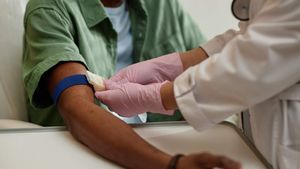December 14 2009 4:24 PM EST
Treatment GuideJust DiagnosedSex & DatingAfrican AmericanStigmaAsk the HIV DocPrEP En EspañolNewsVoicesPrint IssueVideoOut 100
CONTACTCAREER OPPORTUNITIESADVERTISE WITH USPRIVACY POLICYPRIVACY PREFERENCESTERMS OF USELEGAL NOTICE
© 2026 Pride Publishing Inc.
All Rights reserved
All Rights reserved
By continuing to use our site, you agree to our Privacy Policy and Terms of Use.
By about age 50, more than half of adults have dealt with hemorrhoids. The November issue of “Mayo Clinic Health Letter” covers home treatments that can relieve symptoms of this common and embarrassing problem.
[ WELLNESS WEDNESDAY ]
Hemorrhoids are blood-engorged veins in the lower rectum (anal canal) that form tiny sacs (anal cushions) when too much pressure is exerted on the veins serving the pelvic and rectal areas. Increased pressure can result from straining during bowel movements, sitting on the toilet for an extended time, chronic diarrhea or constipation, obesity, lifting heavy objects, sitting or standing for long periods, and pregnancy.
Symptoms can include painless bleeding during bowel movements, leakage of feces and mucus, severe pain, swelling, or inflammation. Embarrassment aside, it's important to talk with a doctor about any rectal bleeding. While hemorrhoids generally don't cause serious problems, other, more serious concerns, such as polyps, cancer or inflammatory bowel disease, can cause bleeding too. A colonoscopy may be needed to determine the cause of bleeding.
Mild pain, swelling, and inflammation from hemorrhoids often can be managed with self-care measures. Options include
>topical over-the-counter remedies. Nonprescription hemorrhoid creams, suppositories containing hydrocortisone, or pads containing witch hazel or a topical numbing agent may provide relief. They shouldn't be used longer than a week unless directed by a doctor.
>leanliness in anal area. Taking a warm sitz bath several times a day can be helpful. A sitz bath, where only the hips and buttocks are immersed, can be done in a regular bathtub or using a plastic tub that fits over the toilet. The tubs are readily available from medical supply stores and pharmacies.
>swelling relief. Ice packs or cold compresses on the anus can relieve swelling.
>pain relievers. Nonprescription pain relievers such as acetaminophen (Tylenol, others), or ibuprofen (Advil, Motrin IB, others) may provide relief.
>hydration and fiber. Softening and bulking up stool for easier passage is helpful. Strategies include drinking six to eight glasses of water or other nonalcoholic beverages daily, eating high-fiber foods, and taking fiber supplements such as Metamucil and Citrucel.
In addition, it's best to head for the bathroom when the urge occurs and to avoid straining or breath-holding when passing stools, since this strains the veins in the lower rectum.
When self-care measures don't work, a doctor can discuss several minimally invasive surgical procedures for consideration.
From our Sponsors
Most Popular
“So much life to live”: Eric Nieves on thriving with HIV
September 03 2025 11:37 AM
It’s National PrEP Day! Learn the latest about HIV prevention
October 10 2025 9:00 AM
Amazing People of 2025: Javier Muñoz
October 17 2025 7:35 PM
“I am the steward of my ship”: John Gibson rewrites his HIV narrative
September 16 2025 2:56 PM
Plus: Featured Video
Latest Stories
HIV-positive men stage 'Kiss-In' protest at U.S.-Mexico border
December 01 2025 12:56 PM
What the AIDS crisis stole from Black gay men
December 01 2025 6:00 AM
The Talk: Owning your voice
August 25 2025 8:16 PM
The lab coat just got queer
August 21 2025 10:00 AM
Messenger RNA could be the key to an HIV vaccine — but government cuts pose a threat
August 20 2025 8:02 AM
The Talk: Beyond the exam room
August 13 2025 3:15 PM
The Talk: Navigating your treatment
August 01 2025 6:02 PM
The Talk: Starting the conversation
July 25 2025 4:47 PM
Thanks to U=U, HIV-positive people can live long, happy, healthy lives
July 25 2025 2:37 PM
How the Black AIDS Institute continues to fill in the gaps
July 25 2025 1:06 PM
“I felt like a butterfly”: Niko Flowers on reclaiming life with HIV
July 23 2025 12:22 PM
Dancer. Healer. Survivor. DéShaun Armbrister is all of the above
July 02 2025 8:23 PM
BREAKING: Supreme Court rules to save free access to preventive care, including PrEP
June 27 2025 10:32 AM
1985: the year the AIDS crisis finally broke through the silence
June 26 2025 11:24 AM
VIDEO: A man living with HIV discusses his journey to fatherhood
June 10 2025 4:58 PM
Trump admin guts $258 million in funding for HIV vaccine research
June 03 2025 3:47 PM

































































